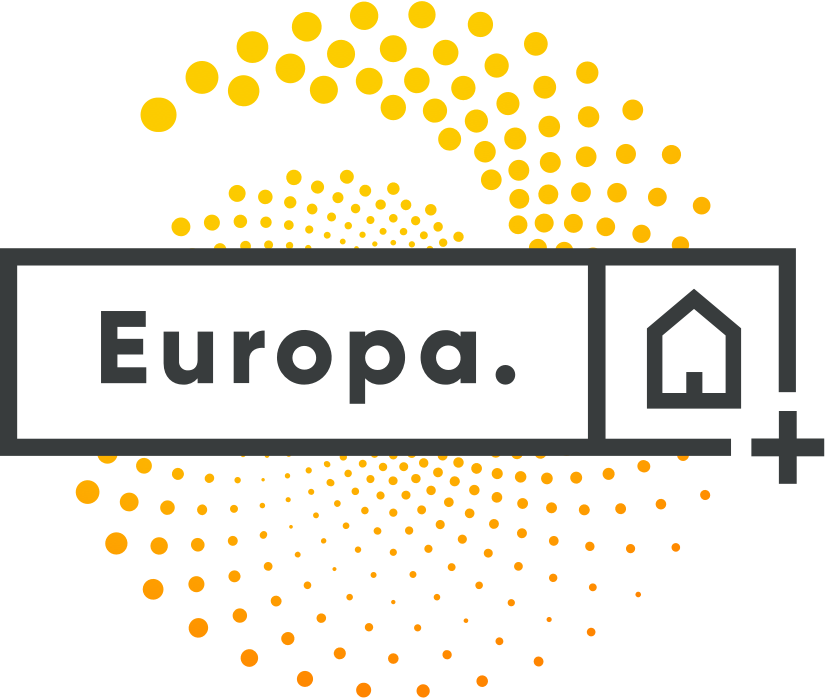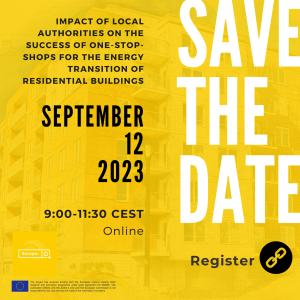News
“Results of the EUROPA Final Conference”
15/09/2023
On September 12, 2023, the EUROPA Final Conference occurred digitally and in Torino, Italy. The conference was split into two events: an online workshop presenting key results of the EUROPA project and focussing on the impact of public authorities on the success of One-Stop-Shops and a physical workshop called “Exchange of One-Stop-Shops Approaches for Residential Energy Renovation”. Both events expanded the existing knowledge of One-Stop-Shops from different points of view and brought diverse experiences of running or working with them in other countries across Europe.
The EUROPA Online Final Conference: “Impact of Local Authorities on the Success of One-Stop-Shops for the Energy Transition of Residential Buildings”
During the morning online session, over 60 participants joined to discuss the role of the public authorities in facilitating One-Stop-Shops. Participants represented a variety of stakeholders, including public authorities, energy agencies, NGOs, and One-Stop-Shops. After the welcoming words from the representative of the coordinating partner Piemonte Region, a session on the European Policy Framework took place to address the existing legislative environment in the building renovation sector. The revision of the Energy Performance of Buildings Directive (EPBD) and Energy Efficiency Directive (EED) will shape the future of the building sector and set several new measures to enable the energy transition and climate neutrality. Both EPBD and EED mention the crucial role of One-Stop-Shops in facilitating the renovation works.
After the policy session, the EUROPA project consortium presented the key results and learnings of the project. Mauro Cornaglia from Environment Park introduced the Energy Efficiency Subscription (EES) concept, adapted to the context of five countries: France, Germany, Italy, Portugal, and Latvia. Representatives from each country later shared their success stories in operating One-Stop-Shops in their respective regions and how this knowledge was later replicated in the mentoring programme.
The second part of the webinar concentrated on the role of local public authorities in facilitating the work of One-Stop-Shops. The session opened with a presentation by LIFE Clean Energy Transition’s Project Adviser, Christophe Milin, on different models and customer journeys of One-Stop-Shops and how public authorities can support them. Crucially, it was stressed that the continuous support of One-Stop-Shops from the LIFE Clean Energy Transition sub-programme is available for both the emerging and existing initiatives.
After that, project partner Reimarkt led the interactive session on the impact of public authorities’ involvement in One-Stop-Shops. By answering the questions presented, the attendees shared their thoughts on how much the public authorities should be involved in One-Stop-Shops’ work. After the session, most attendees agreed on the importance of public authorities’ involvement and ownership of the One-Stop-Shop to improve its work and increase the trust of the end-users.
The final conference of EUROPA helped to highlight some important reflections:
- The One-Stop-Shops are growing intensively in Europe and the European Commission is in the process of introducing relevant regulations, therefore a further roll-out and more regulated environment is foreseen.
- One-Stop-Shops contribute to increasing the rate of renovations, this can be done either with a deep renovation approach or with the step-wise approach.
- The EUROPA project demonstrated in practice the “not-one solution” direction showcasing a variety of options for the establishment and strengthening of One-Stops-Shops especially in regions that have not been well served before.
- The mentoring process has also been very valuable and making training materials available is essential to build a community of practice as the new project EU-PEERS envisage.
EUROPA Final Conference: “Exchange of One-Stop-Shops Approaches for Residential Energy Renovation” Workshop in Torino, Italy
In the afternoon, the physical workshop in Torino, Italy was organised in cooperation with four other projects: Project “Easier”, “Top Condomini”, “Transition Point”, and “Opengela”. By dividing all the attendees into four groups, each group had an opportunity to learn about all projects and to ask questions about specific initiatives. The diversity of the approaches showed the participants how important the adaptation to the local context and the use of different engagement practices is to run a One-Stop-Shop successfully. After the exchange of practice with other projects, the EUROPA project consortium has presented what other projects can exploit from the EUROPA project and what the EUROPA project consortium can take from the other projects. The knowledge exchange was essential to assess the difference in existing framework conditions and how building trust between all the stakeholders is the most critical step in facilitating the renovation works and decarbonising the building sector.
Among the several aspects, the following have been commonly shared:
- The importance of local authorities in promoting in different ways the services that the One-Stop-Shops can provide to homeowners. This is essential mainly in the energy poverty topic and in bridging a trustful connection with people.
- Communication is more and more important, either in building the motivations (i.e. indoor quality and comfort, rather than energy efficiency and renewables) and in addressing the target group.
- The One-Stop-Shops must be part of an overarching energy strategy and not stand-alone initiatives.
- The “start small, but think big” approach should be followed and it is essential to expand the outreach of the initiatives, contaminating other territories and regions with connected initiatives working together for the energy transition to a carbon-neutral society.



